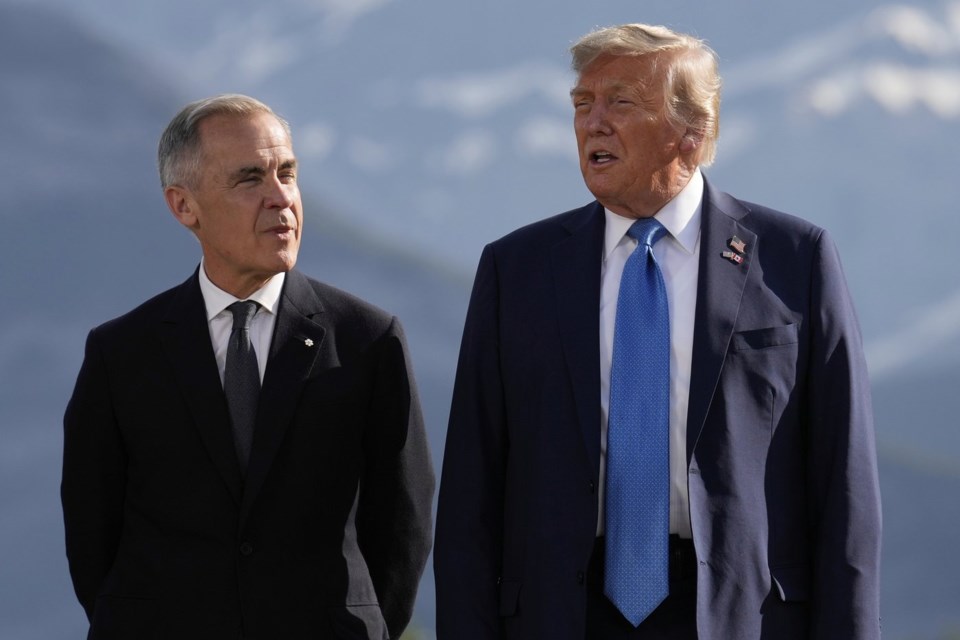OTTAWA — Canada is rescinding its digital services tax and will resume trade negotiations with the United States, Finance Minister François-Philippe Champagne said in a statement issued late Sunday night.
The announcement came following a phone call between Prime Minister Mark Carney and U.S. President Donald Trump, and just hours before the first payment under the tax was going to come due for major tech companies like Amazon and Google.
On Friday Trump announced on his social media platform Truth Social he was terminating all trade discussions with Canada because of the tax.
"Today’s announcement will support a resumption of negotiations toward the July 21, 2025, timeline set out at this month’s G7 Leaders’ Summit in Kananaskis," Carney said in a written statement on Sunday.
He also said Canada's negotiations with the U.S. "will always be guided by the overall contribution of any possible agreement to the best interests of Canadian workers and businesses.
A spokeswoman for Carney confirmed the call with Trump, and also said Champagne spoke Sunday with U.S. Treasury Secretary Scott Bessent.
In his Friday post, Trump called the digital services tax a "direct and blatant attack" on the U.S. and threatened to hit Canada with another round of punishing tariffs, saying he'd inform Canada by July 4 of the cost "to do business with the United States."
It was a sudden change of heart by the president, less than two weeks after Trump and Carney appeared to have a positive bilateral discussion at the G7 summit, where they agreed to try and conclude their trade talks within a month.
Carney and Trump have been negotiating since early May, when Carney visited the White House after the conclusion of the Canadian election. The two had agreed early during that campaign that Canada and the U.S. would work on a new economic and security deal once Canadians decided on their new government.
Those discussions came after Trump imposed punishing tariffs on Canada, along with most other countries. Earlier this month Trump doubled already devastating duties on aluminum and steel to 50 per cent.
Neither Trump nor the White House have yet commented on Canada's decision to rescind the tax.
The tax was going to apply to all big tech companies that operate online marketplaces or advertising services and social media platforms, and those that earn revenue from some sales of user data. It wasn't specific to the U.S. but most of the companies affected by it are American, including Google, Meta and Amazon.
The U.S. has criticized the tax for years, and the administration of former president Joe Biden lobbied Canada hard not to proceed with it. In August the Biden administration launched dispute settlement consultations with Canada under the Canada-United States-Mexico Agreement.
The U.S. alleged the tax discriminated against U.S. companies.
The tax was first promised by the Liberals in 2019 under then-prime minister Justin Trudeau. They included it in the fall economic statement a year later, but it didn't become law until 2024.
The first payment on Monday was to be retroactive for three years, and was estimated to likely be close to $2 billion. The Parliamentary Budget Officer has previously estimated Canada would raise about $7.2 billion under the tax over five years.
Daniel Béland, a politics professor at McGill University in Montreal, called Carney's retreat a “clear victory" for Trump.
"At some point this move might have become necessary in the context of Canada-US trade negotiations themselves but Prime Minister Carney acted now to appease President Trump and have him agree to simply resume these negotiations, which is a clear victory for both the White House and big tech," Béland said.
He said it makes Carney look vulnerable to President Trump’s outbursts.
“President Trump forced PM Carney to do exactly what big tech wanted. U.S. tech executives will be very happy with this outcome,” Béland said.
— With files from Dylan Robertson and Anja Karadeglija and The Associated Press
This report by The Canadian Press was first published on June 29, 2025.
Cassidy McMackon, The Canadian Press




